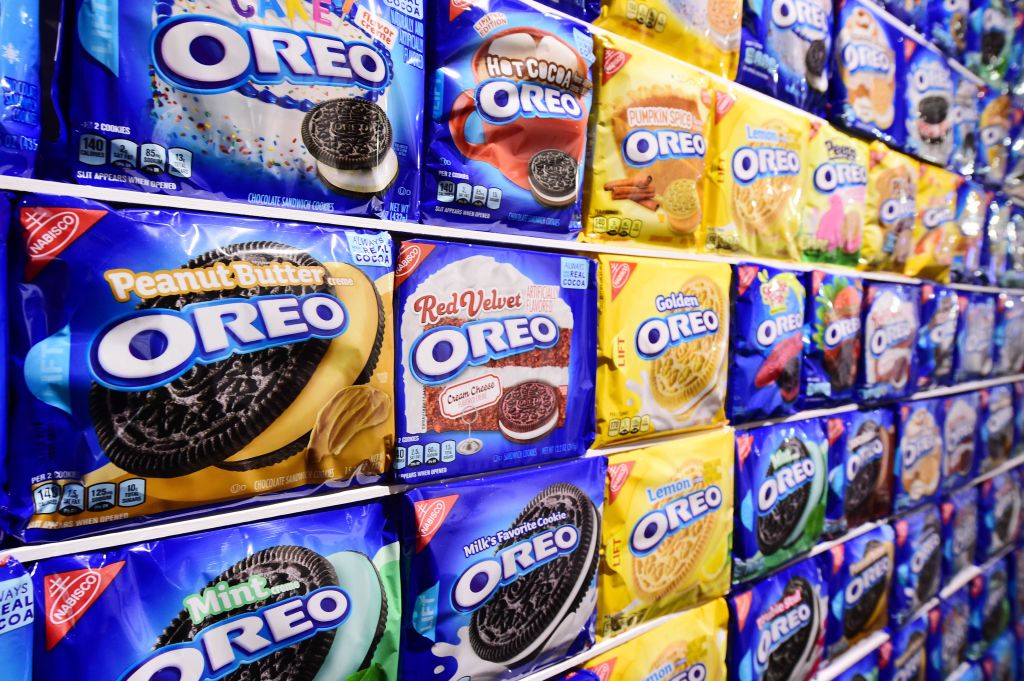Are Americans at risk of losing access to dozens of their favorite snack foods? That’s what one viral image being shared across Facebook claims. “Everyday food snacks facing ban,” says the image’s title, alongside pictures of Lucky Charms, Flamin’ Hot Cheetos, Oreos, and Gatorade. “UNITED STATES YOUR FAVS ARE COMING TO AN END !!” exclaims the caption of one post featuring the image with more than 48,000 shares. The image’s virality follows a spike in media coverage of the issue, including an April 20 Fox and Friends Weekend segment about potential food-additive bans and articles from outlets including the New York Post, News Nation, and Daily Mail. While the viral image features a Fox News logo, The Dispatch Fact Check could not confirm its authenticity or whether it was actually used in recent programming; it was not featured on Fox and Friends Weekend.
The image includes actual snack foods that would face restrictions under proposed or passed legislation in a handful of states, but it refers to food additives that are mostly not facing regulation and is otherwise missing context. The only ban to be signed into law is limited to California and won’t go into effect until 2027.
What’s with the food-additive bans?
Recent legislative action in a number of U.S. states has increased attention on potential food additive bans. In October 2023, California Gov. Gavin Newson signed legislation that will ban certain substances from foods in the state beginning in 2027. The bill—The California Food Safety Act—restricts the manufacture, delivery, and distribution of food products containing four substances: brominated vegetable oil, potassium bromate, propylparaben, and red dye No. 3. A similar bill was introduced in the New York state legislature in June 2023 that would ban the same four substances as well as titanium dioxide. Legislators in New Jersey, Pennsylvania, Missouri, and Illinois have all proposed similar restrictions.
While these substance bans currently exist only at the state level, there have been some efforts to review and ban certain additives nationally. On March 8, 2024, Illinois Rep. Jan Schakowsky introduced the Agricultural Food Chemical Reassessment Act, which would require the U.S. Department of Agriculture’s (USDA) Food Safety and Inspection Service (FSIS) to reassess seven chemicals used in some food products: butylated hydroxyanisole, butylated hydroxytoluene, cetylpyridinium chloride, sodium aluminum phosphate, sodium nitrite, sulfuric acid, and titanium dioxide. In 2023, Schakowsky also introduced legislation that would create an Office of Food Safety Assessment in the Food and Drug Administration (FDA). Neither bill has yet progressed out of committee.
Some of the chemicals subject to new or proposed state restrictions are also already being considered for nationwide restrictions by the FDA. In November 2023, the FDA proposed a revocation of the approved use of brominated vegetable oil because of new evidence for adverse health effects, and the agency is actively reviewing a November 2022 petition for the restriction of red dye No. 3.
What about my Oreos?
Despite food additive restrictions gaining momentum in some state legislatures, the specific dyes identified in the viral Facebook post—yellow No. 5, yellow No. 6, and blue No. 1—are targeted only in a March 2024 Pennsylvania bill and a February 2024 bill introduced in California that would restrict their use in the state’s school meals. None are included in California’s upcoming 2027 ban. Lucky Charms cereal contains yellow No. 5, yellow No. 6, and blue No. 1, Flamin’ Hot Cheetos contains yellow No. 5 and yellow No. 6, and Gatorade uses a variety of dye additives depending on flavor. Classic Oreos, however, do not actually contain any of the other additives being considered for restrictions, including blue No. 1 as identified in the post. Some alternative Oreo flavors, however, such as Mint and an upcoming Sour Patch Kids variety, do contain dye additives including blue No. 1 and yellow No. 5.
If you have a claim you would like to see us fact check, please send us an email at factcheck@thedispatch.com. If you would like to suggest a correction to this piece or any other Dispatch article, please email corrections@thedispatch.com.







Please note that we at The Dispatch hold ourselves, our work, and our commenters to a higher standard than other places on the internet. We welcome comments that foster genuine debate or discussion—including comments critical of us or our work—but responses that include ad hominem attacks on fellow Dispatch members or are intended to stoke fear and anger may be moderated.
With your membership, you only have the ability to comment on The Morning Dispatch articles. Consider upgrading to join the conversation everywhere.